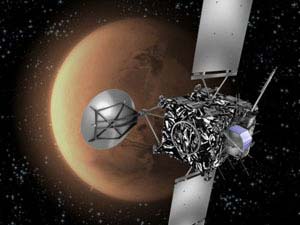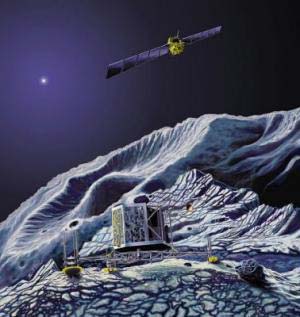European probes speed up thanks to Mars
The Rosetta space probe yesterday, Sunday, February 25 flew over 250 kilometers from Mars on the distant road to Comet Churumova - Gerasimenko. The meeting is expected to happen in 2014.

Mars's attractive school makes the ship speed up (Photo: ESA)
This movement is very important for the mission of the probe because the gravitational field of Mars will accelerate it. Some of the acceleration by this method will help the ship exceed 7 billion km on the road to meet the cosmic guest.
In the most important moment, within 15 minutes, the probe did not contact the Control Center because it was in the shadow of the Red Planet. During that time, the automatic machines on the ship's control compartment.
When the movement of the ship ended and communication was restored, at the European Space Flight Control Center there were applause.
This $ 1.2 billion probe was launched by European Aerospace in 2004. At the end of its path, it will drop a probe into the surface of Churyumov - Gerasimenko, the comet has. 4 km in diameter. If successful, it was the first man-made device to face a comet.
There are 5 devices on the ship to study the structure and material of comets. Scientists hope that the analysis of the comet's matter will help decipher many mysteries about the process of forming the solar system.
This year and in 2009, the aforementioned probes also made two moves to take advantage of the attractive field to accelerate. In both cases, acceleration agents are all earth.

The image illustrates the probe dropping the device
Comet surface (Photo: sciencedaily)
Thuy Vi
- The NASA autonomous probe is about to land on Mars
- Schiaparelli probes began the process of landing on Mars
- Working well, the Mars probe has yet to become cosmic garbage
- Locate the answer for Europe's Mars mission
- Decrypt data from Russian spacecraft
- Ancient 'tree' on Mars
- Russia and Europe will explore Mars together
- Beautiful images are only available on Mars
- How did Mars ever flood?
- Journey to discover Mars
- NASA will launch more probes on Mars
- InSight probes capture sunrise and sunset on Mars
 Van Allen's belt and evidence that the Apollo 11 mission to the Moon was myth
Van Allen's belt and evidence that the Apollo 11 mission to the Moon was myth The levels of civilization in the universe (Kardashev scale)
The levels of civilization in the universe (Kardashev scale) Today Mars, the sun and the Earth are aligned
Today Mars, the sun and the Earth are aligned The Amazon owner announced a secret plan to build a space base for thousands of people
The Amazon owner announced a secret plan to build a space base for thousands of people